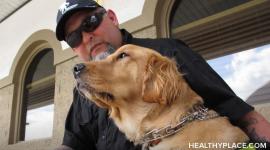10 Positive Ways of Dealing with PTSD

The idea of positively dealing with PTSD can seem absurd when you are living the nightmare that PTSD can be. It is natural to feel as though your entire world, internal and external, has shattered, and if you sometimes feel overwhelmed and unable to deal with PTSD, you’re not alone (PTSD Symptoms and Signs of PTSD). Feeling lost, broken, and unable to cope are common experiences of people living with PTSD. These thoughts and emotions arise from the trauma and are tricks that PTSD plays on your brain. PTSD is something you’re dealing with; it is not who you are. But how can you deal with PTSD? Here are 10 positive ways of dealing with PTSD to get you started.
10 Positive Ways of Dealing with PTSD
- Set small, realistic goals. Where are you right now? Where do you want to be tomorrow? What little things can you do today to get there?
- Break daunting problems and large tasks into manageable bits. PTSD can make life feel like one big, overwhelming picture. Take it apart and deal with small pieces at a time.
- Build social support. Don’t isolate. People need human connection to heal (PTSD Help: PTSD Support Groups Can Help PTSD Recovery). It’s okay to start small (working in little bits is a theme in PTSD recovery). Reach out to even one friend or family member, share what triggers you so they can support you through intrusive memories, nightmares and flashbacks.
- Build problem-solving and communication skills. PTSD interferes with someone’s ability to solve problems and communicate with others. Working with a therapist or even using self-help books can help you rebuild these skills, improve your relationships, and meet your goals.
- Exercise a little every day. Set a goal to simply move. Research has proven that even mild activity done in 10-15 minute increments reduces stress and increases wellbeing.
- Practice stress reduction and relaxation techniques to decrease arousal and deal with PTSD’s intrusive memories. Keep it simple. Breathe slowly and deeply for a few moments, tense and relax muscles in your body, do a few yoga stretches or an entire routine, visualize peace and tranquility, or engage in other healthy, relaxing activities.
- Seek out comforting situations, people, and places. Again, start small. Identify one place or one person that feels safe, and go to the place, connect with the person. This is an effective way to deal with the avoidance effects of PTSD.
- Include ways to play, be creative, and reintroduce passion and joy. Dealing with PTSD can be difficult in part because trauma and PTSD rob someone of his/her ability and desire to enjoy life. Happiness and joy are essential for people’s mental health and wellbeing. Identify little things that bring a smile to your face and even laughter to your heart, and pursue them regularly. You might not smile or laugh right away, and that’s okay. Keep it up, and you will.
- Discover new inner strengths. Dealing with PTSD is a positive journey of healing and rediscovery. You are engaging in a process of finding once again the good in yourself and in life.
- Intentionally look ahead to make meaning of life after trauma. Keep a journal, scrapbook, secret Pinterest board—whatever you like—where you record thoughts, images, inspirational PTSD quotes, and more that are personally meaningful for you and your life. This brings us full circle to number one. Setting goals that are small and personally meaningful are positive ways to deal with PTSD.
How to deal with PTSD? Be patient with yourself. Healing is a process rather than an event (How Long Does PTSD Last? Does PTSD Ever Go Away?). Finding positive ways to deal with PTSD, such as the ten ideas above, and incorporating some of them into your life every single day will help you reclaim yourself and your life. Dealing with PTSD is important, and it is absolutely possible.
APA Reference
Peterson, T.
(2021, December 17). 10 Positive Ways of Dealing with PTSD, HealthyPlace. Retrieved
on 2026, January 19 from https://www.healthyplace.com/ptsd-and-stress-disorders/ptsd/10-positive-ways-of-dealing-with-ptsd



